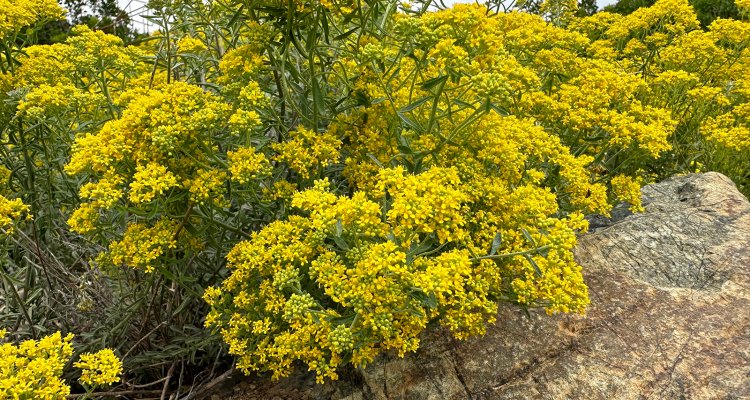Wageningen, The Netherlands
November 11, 2024

An international team of researchers, including scientists from Wageningen University & Research, is investigating the potential for plants to extract nickel from soil. Nickel is an essential metal for producing lithium batteries. The project has received a grant of 1.35 million euros from the U.S. Department of Energy.
The research focuses on two plants from the mustard family that are known for their ability to absorb metal from the soil and incorporate it in their own tissues, a process known as phytomining. Nickel can then be harvested from the metal-rich plant biomass and subsequently used for industrial applications.
Environmentally friendly metal extraction
Nickel is recognized as an important metal for developing a cleaner economy. For instance, it is a key component in lithium-ion batteries used in electric vehicles. “Using plants, we can extract nickel from the soil without the severe environmental damage that traditional open-pit mining causes. Moreover, converting the bio-ore into nickel metal releases significantly less carbon dioxide,” says WUR researcher Antony van der Ent, who, along with fellow researcher Mark Aarts, is involved in the project. “Our research contributes to a sustainable future.”
In this project, the DNA of the plants is being analyzed to identify genes that enhance nickel uptake and storage, and that influence growth and biomass production. This genetic information will support the development of plant cultivars with improved nickel accumulation and increased biomass, yielding larger quantities of harvested nickel.
Delaying Flowering for Increased Nickel Accumulation
The research team is also exploring methods to delay flowering in these plants. By delaying flowering, the plants could allocate more energy toward tissue growth, increasing the nickel content in the plant. According to the researchers, phytomining has the potential to become a completely new, sustainable approach to extract industry-critical metals from the soil.
In addition to researchers from WUR, the team includes scientists from the University of Wisconsin-Madison and Illinois State University, as well as the French company Botanickel, which focuses on sustainable nickel production using phytomining.
Onderzoekers willen nikkel winnen met mosterdplanten
Een internationaal team van onderzoekers, waaronder wetenschappers van Wageningen University & Research, onderzoekt hoe planten kunnen worden gebruikt om nikkel te winnen. Nikkel is een metaal dat essentieel is voor de productie van lithiumbatterijen. Het onderzoek heeft een subsidie ontvangen van omgerekend 1,35 miljoen euro van de Amerikaanse Department of Energy.
Het onderzoek richt zich op twee planten uit de mosterdfamilie die bekend staan om hun vermogen om metaal uit de bodem te halen en op te nemen in hun eigen weefsel, een proces dat ook wel bekend staat als fytomining. Het nikkel kan vervolgens uit het metaalrijke plantenweefsel worden geoogst en vervolgens worden gebruikt voor industriële doeleinden.
Milieuvriendelijk metalen winnen
Nikkel wordt gezien als een belangrijk metaal voor de ontwikkeling van een schone economie. Zo is het een belangrijk onderdeel van de elektrische lithiumbatterijen die in elektrische auto's worden gebruikt. “Met behulp van planten kunnen we nikkel uit de bodem halen, zonder de grote milieuschade die conventionele dagmijnbouw veroorzaakt. Ook komt er veel minder koolstofdioxide vrij bij het omzetten van het bio-erts in nikkel metaal. Ons onderzoek draagt zo bij aan een duurzame toekomst,” zegt WUR-onderzoeker Antony van der Ent, die samen met collega-onderzoeker Mark Aarts bij het project betrokken is.
In dit project wordt het DNA van planten onderzocht om genen op te sporen die helpen bij het opnemen en opslaan van nikkel, en die invloed hebben op hoe de planten groeien en hoeveel biomassa ze opleveren. De onderzoekers zullen deze informatie gebruiken om gekweekte variëteiten van planten te ontwikkelen met een verbeterde nikkelaccumulatie en een verhoogde biomassa, wat resulteert in grotere hoeveelheden geoogste nikkel.
Bloei uitstellen voor meer nikkel
In het lab wordt ook onderzocht hoe de bloei van planten kan worden uitgesteld. Door het uitstellen van de bloei zouden de planten meer energie kunnen steken in het groeien van weefsel waardoor de hoeveelheid nikkel in een plant kan toenemen. Fytomining zou volgens de onderzoekers een geheel nieuwe manier kunnen zijn om op duurzame wijze industrie-kritieke metalen uit de bodem te halen.
Naast onderzoekers van WUR bestaat het team uit onderzoekers van de Amerikaanse universiteiten van Wisconsin-Madison en Illinois State en het Franse bedrijf Botanickel, dat zich richt op de duurzame productie van nikkel met fytomining.